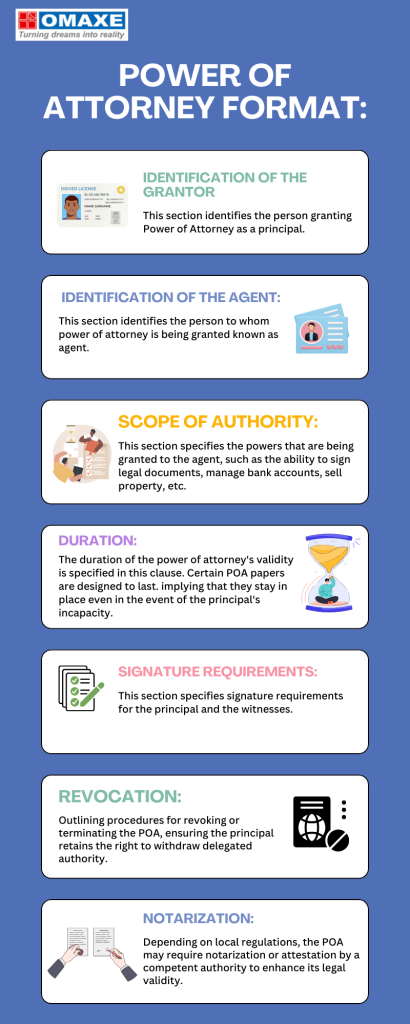The Power of Attorney (POA) in India is a crucial document in Indian real estate transactions. It gives the attorney—a named individual—the power to act on behalf of the landowner. This article seeks to clarify the meaning of power of attorney in Indian real estate, highlighting its importance and how it expedites transactions involving real estate and more.
Table of Contents:
- What is Power of Attorney?
- Latest Updates of Power of Attorney (POA)
- Types of Power of Attorney (POA)
- How does Power of Attorney Work?
- How to select a Power of Attorney (POA)?
- Who can be chosen as the Power of Attorney (PoA)?
- Power of Attorney Format:
- A Step-by-Step Guide for Drafting Power of Attorney Deed
- Why Power of Attorney is a Game-Changer in Property Affairs
- Conclusion
- FAQs:
What is Power of Attorney (POA)?
Not only is a power of attorney in India (PoA) a legal document. It’s a lifeline that enables someone to behave in another person’s place, particularly while they’re not there.
This legal document, which is governed by the Powers of Attorney Act of 1882, is frequently misinterpreted yet is extremely important for a variety of activities, including property management and healthcare choices.
Latest Updates of Power of Attorney (POA)
A significant judgment has been passed by the Supreme Court of India which is related to the Title Transfer of Properties. The Title Transfer Supreme Court being the apex Court has opined that Power of Attorney or Agreement of Sale cannot be considered sufficient if the presence of a registered document is compulsory for title transfer.
The Supreme Court has also said that ownership of a property can only be established when there are registered documents by quoting the ‘Registration Act, of 1908.
Also Read: What are the Legal Documents Required to Buy a Home in India?
Types of Power of Attorney (POA)
1. General Power of Attorney:
A legal instrument with several uses is the General Power of Attorney (GPA). It gives the agent extensive Power to act in the principal’s place. A GPA covers everything, including signing a sale deed and appearing on your behalf in court. It’s important to remember, too, that this kind of PoA is frequently time-limited and limited to particular tasks.
Common Use-Cases
- Handling bank transactions
- Managing real estate
- Overseeing business operations
- Representation in legal matters
2. Limited or Special Power of Attorney:
A Special Power of Attorney is restricted to certain tasks or circumstances, unlike a GPA. For example, you can give someone a Special POA so they can sell a certain property. It’s more targeted and prevents the agent from having complete control over all of your matters.
Common Use-Cases
- Selling a particular property
- Representing you in a specific legal case
- Managing a single financial account
3. Durable Power of Attorney:
The duration of a durable power of attorney is indefinite. The PoA is still in effect even if you become incapacitated. This guarantees that, whatever life throws at you, your affairs are taken care of.
Common Use-Cases
- Long-term healthcare decisions
- Managing assets during incapacity
4. Medical or Healthcare Power of Attorney
This kind of PoA is reserved for healthcare decisions. It only becomes relevant when you are unable to make those choices for yourself. The agent can cover your medical expenses but is not able to make decisions that might end your life, such as removing your life support.
Common Use-Cases
- Choosing medical treatments
- Deciding on life-support measures
How Does Power of Attorney Work?
Power of Attorney in India becomes a legally binding document that makes sure that the agent will act within the scope of authority granted by the principal, upon its execution. While exercising delegated powers the agent prioritizes the principal’s interests and assumes them as his fiduciary responsibility.
POA agreements can range in length from short-term mandates for specific tasks to long-term agreements that remain in effect until they are revoked or the principal passes away.
How to select a Power of Attorney (POA)?
Selecting the ideal person to act as the agent is a crucial choice that requires serious thought. The selection procedure should be guided by elements including expertise, proximity, trustworthiness, and acquaintance with pertinent financial and legal issues.
It is best to communicate openly with potential agents, outlining duties, obligations, and any restrictions related to the POA agreement.
Also Read: Property Tax Guide for 2024: Calculation, Importance, and Online Payment
Who can be chosen as the Power of Attorney (PoA)?
Your agent can be any competent adult, including a professional such as an attorney, accountant, or banker. But they may also be a family member such as a spouse, an adult child, or another relative.
Naming a family member as your agent saves the fees a professional would charge and may also keep confidential information about your finances and other private matters “in the family.”
Before finalizing a person as a Power of Attorney in India, it is crucial to consider the value system and character of a person. The person who is chosen as a POA should be able to make decisions clearly and firmly.
Power of Attorney Format:
- Identification of the grantor: This section identifies the person granting Power of Attorney as a principal.
- Identification of the agent: This section identifies the person to whom power of attorney is being granted known as agent.
- Scope of Authority: This section specifies the powers that are being granted to the agent, such as the ability to sign legal documents, manage bank accounts, sell property, etc.
- Duration: The duration of the power of attorney’s validity is specified in this clause. Certain POA papers are designed to last. implying that they stay in place even in the event of the principal’s incapacity.
- Signature requirements: This section specifies signature requirements for the principal and the witnesses.
- Revocation: Outlining procedures for revoking or terminating the POA, ensuring the principal retains the right to withdraw delegated authority.
- Notarization: Depending on local regulations, the POA may require notarization or attestation by a competent authority to enhance its legal validity.

A Step-by-Step Guide for Drafting Power of Attorney Deed
Drafting the Deed:
The drafting of a Power of Attorney deed is the first and most important stage. Give a clear description of the power granted and to whom it is given. To make sure the deed is error-free, it is important to speak with a legal professional.
Legal Requirements and Documentation:
- Identity Proof: Aadhaar Card, Passport, or Voter ID.
- Address Proof: Utility bills or bank statements
- Two Witnesses: They must also provide their identity and address proofs.
Signature and Registration:
The deed must be signed by the witnesses, the grantor, and the lawyer. The deed must then be notarized and filed with the district sub-registrar’s office.
Also Read: What is the RERA Act 2016? Everything You Need to Know About the RERA Act!
Why Power of Attorney is a Game-Changer in Property Affairs
A power of attorney can be used for several important property-related purposes, including:
- Property Purchase: A buyer can designate an attorney-in-fact to finalize the purchase in cases when they are unable to be present in person. This is particularly helpful for Non-Resident Indians (NRIs) who are purchasing Indian real estate from outside.
- Property Sale: Property owners can expedite the procedure for a seamless transfer of ownership by assigning selling duties to an attorney-in-fact.
- Property Management: On behalf of the property owner, an attorney-in-fact can take care of things like maintenance, tenant relations, and rent collection.
- Property Litigation: A Power of Attorney permits an attorney-in-fact to represent the principal in court during real estate legal issues.
Conclusion:
In the context of Indian real estate, a power of attorney is essential for facilitating property transfers. It allows property owners to assign responsibility to a reliable agent while providing them with ease, flexibility, and peace of mind. Therefore, for a hassle-free and seamless property acquisition procedure, it is important to comprehend the significance of the POA.
With the crucial role that Power of Attorney plays in the ever-changing real estate market, people may confidently negotiate property matters and use the knowledge of Top real estate developers in India to achieve their investment goals.
FAQs:
1. What is a Power of Attorney?
A power of attorney (POA) is a legal document that grants the agent, also known as the attorney-in-fact, the right to act on behalf of a person known as the principal.
2. What is the purpose of the power of attorney?
A power of attorney can be helpful to older people and others who want to choose a trusted person to act on their behalf when they cannot take necessary actions.
3. What are the types of power of attorney?
The different types of Power of Attorney, including General Power of Attorney, Special Power of Attorney, and Limited Power of Attorney, serve distinct purposes and are essential documents for delegating authority and making decisions on behalf of someone else.
4. What is the best form of power of attorney?
General power of attorney is the best type of POA because it gives your agent broad powers that will remain in effect if you lose the ability to handle your finances.
5. How long is a power of attorney valid?
PoA remains valid only till the life of the principal. Within their lifetime also, one can revoke the PoA. A SPA gets revoked on its own as soon as the specific transaction for which it was executed is completed.
6. What is the format of the power of attorney?
The format of the POA includes identification of the grantor, identification of the agent, scope of authority, duration, signature requirement, revocation, and notarization.
7. What do you mean by a durable power of attorney?
A durable POA gives someone else legal authority to act on your behalf, and it continues in force even if you lose your mental capacity.
8. How do you revoke the power of attorney?
As long as the principal is mentally sound, a PoA can be canceled; in the event of the principal’s death, the PoA is immediately annulled. The principal shall deliver the document to the agent, sign it in front of a notary public, and notify the agent in writing of the revocation.
9. Is it possible to appoint multiple Power of Attorney?
Yes, an individual can select multiple attorneys and also decide whether they must act separately or jointly while making a decision. Multiple attorneys help in making a sound decision by discussing all the advantages and impediments.
10. What are the legal requirements for a Power of Attorney in India?
Firstly, it must be executed before a Notary Public and secondly, it must be authenticated by a Notary Public.
11. What are the responsibilities of a Power of Attorney holder?
A power of attorney provides an agent “all powers that the principal has’ ‘ to manage the principal’s financial affairs or make healthcare decisions may be enough for many purposes.


